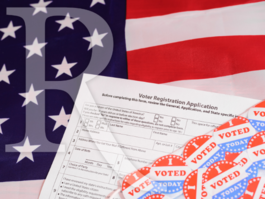Immigration Reform No Place for Games
A Commentary By Froma Harrop
Consider this immigration case from Canada: Three years ago, a Mexican sister and brother moved illegally to Toronto. Brenda Garcia, 30, filed for refugee status, claiming fear of persecution back home for being lesbian. Her brother, 18-year-old Daniel Garcia, enrolled in a Toronto high school. Both said they might be killed upon returning to Mexico City.
Here are two fairly harmless individuals. (Daniel was said to be a very good student.) Toronto neighbors supported their cause. But the judge didn't buy the story of persecution. Canada deported Brenda to Mexico two days after Christmas, and Daniel was returned on New Year's Day.
On the surface, Canada's action sounds heartless. But this is how you retain public support for a large immigration program that generously extends government benefits, including health care, to newcomers. You don't tolerate game-playing with the rules.
And that's what was wrong with such seemingly big-hearted proposals as the recently shelved Dream Act. Backed mostly by Democrats, the legislation would have helped illegal immigrants who arrived in this country as children and completed two years of college or military service become citizens. We saw the parade of exemplary young people. They were a lot like Brenda and Daniel Garcia.
Unfortunately, the Dream Act was an emotionally manipulative end-run around our immigration laws. It added to the public's cynicism over congressional intentions while distracting attention from a bipartisan proposal that would have accomplished the same thing.
You remember the immigration "grand bargain" of 2007. That bipartisan proposal went down in flames because Americans saw it as another amnesty paired with an empty promise of more stringent enforcement.
The proposal for comprehensive immigration reform would put most illegal immigrants on the "path to citizenship," while instituting an enforcement system that would fine or possibly jail employers who hire undocumented workers. The job magnet that attracts the vast majority of illegal immigrants would thus be gone and the problem mostly solved.
Recall that 2007 was a year before the economic roof caved in. What's left in the gray dawn of 2011 is a new reality that was masked by the housing bubble: Americans with little education have a very tough future in the global economy. The idea of flooding our labor force with low-skilled competition is crazier than ever.
These changing circumstances have sparked the movement to end birthright citizenship. The 14th Amendment to the U.S. Constitution declares that anyone born on America soil is automatically a U.S. citizen.
Opponents of birthright citizenship argue that it also attracts more illegal immigrants. Actually, the notion that "anchor babies" -- American-born children of illegal immigrants -- can easily alter their parents' status is something of a myth. Such children cannot sponsor their parent for legal status until they are age 21.
But the idea of U.S.-born children getting all the rights of American citizenship surely must add to the attraction of coming to the United States without papers. Deported illegal immigrants with U.S.-born children often charge American authorities with breaking up their families. (Of course, their children could return with them to their home countries.) Such accusations add to the general impression that birthright citizenship is a loophole for illegal immigration.
By the way, Canada also allows for birthright citizenship. Granted, it's easier for poor Central Americans to cross into the United States than to travel to Canada. But birthright citizenship wasn't a big American concern before we opened our economy to illegal labor.
And dragging this hot element into today's immigration debate will make comprehensive reform still harder to achieve. Get the basics done -- no more hiring of illegal workers -- and everything else may fall into place.
COPYRIGHT 2010 THE PROVIDENCE JOURNAL CO.
See Other Political Commentary.
See Other Commentaries by Froma Harrop.
Views expressed in this column are those of the author, not those of Rasmussen Reports.
Rasmussen Reports is a media company specializing in the collection, publication and distribution of public opinion information.
We conduct public opinion polls on a variety of topics to inform our audience on events in the news and other topics of interest. To ensure editorial control and independence, we pay for the polls ourselves and generate revenue through the sale of subscriptions, sponsorships, and advertising. Nightly polling on politics, business and lifestyle topics provides the content to update the Rasmussen Reports web site many times each day. If it's in the news, it's in our polls. Additionally, the data drives a daily update newsletter and various media outlets across the country.
Some information, including the Rasmussen Reports daily Presidential Tracking Poll and commentaries are available for free to the general public. Subscriptions are available for $4.95 a month or 34.95 a year that provide subscribers with exclusive access to more than 20 stories per week on upcoming elections, consumer confidence, and issues that affect us all. For those who are really into the numbers, Platinum Members can review demographic crosstabs and a full history of our data.
To learn more about our methodology, click here.



